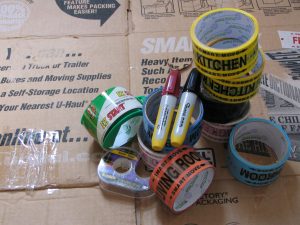Are you moving with a pet? Just like moving is stressful for people, pets also get anxious during this time. Here are some general tips to make moving day easier for your pets, with some specific tips for cats, fish, guinea pigs, and birds!
Make an overnight kit
Gather dog food, kitty litter, toys, grooming tools, or whatever you need to keep your pets comfortable during the first few days at a new home.
Communicate with your vet
If you’re moving long-distance, ask your vet for your pet’s health records and see if you can take any prescription medications with you. They might also be able to recommend a vet in your new neighbourhood.
Arrange for pet care on moving day
On moving day, the best way to reduce your pets’ stress is to keep them in the quietest area possible. The best choice is to leave them at a kennel for the day. Another good option is to ask a friend or family member to take them. If none of that can be arranged, at the very least remove them from all the moving activity. Put them in an empty room on another floor and close the door, or put them in their carrier or kennel in the garage or car (at a safe temperature and with water and food). Check on them regularly, and try to feed or walk them at the usual times. Your pets will appreciate the normal routine on moving day.
Bring pets in your own vehicle
Bring your pets to your new home in your own car. Cats and small dogs can ride in a carrier in the back seat and secured with a seatbelt. Bigger dogs can go in a kennel in the back. Some pets feel more comfortable with a blanket over their carrier during the ride so they can’t see the surroundings changing.

Let your pets out when you are inside your new home
It’s important to keep your pets in carriers or kennels until you are inside your new home. Because this is a new home and a new neighbourhood, your pets can easily get lost in this unfamiliar place. Give them a few days to become familiar with everything new.
Increasingly, cat owners are keeping their cats indoors for safety reasons. Your moving preparation is an opportunity to train them to stay inside before they arrive in your new home.
Establish new routines quickly
Set up as much of your new home as you can, even if it’s just one room, so you introduce your pets to the new routine with familiar objects like toys or blankets. Keep them in one section of the house as they adjust and give them lots of attention.
Update pet tracking info
After you move, update their tags or microchip information to your new address and phone number.
Tips for moving with fish
Fish experience strong reactions in stressful situations and a move can be traumatizing or even fatal. If you are moving a short distance, transport them in bags filled with their old tank water. For long-distance moves, it’s in their best interests to give them a new home with a friend, and buy new fish at your new home.

Tips for moving with guinea pigs
Guinea Pigs also are also sensitive to change and being jostled around, especially their hearts. Take care of your guinea pigs by transporting them in a warm, comfortable, small carrier.

Tips for moving with birds
Like other pets, birds get nervous during a move. Just because your birds may not fly very far from you in your current home, that doesn’t mean they won’t fly away in a strange new place. Keep your birds in their cages until they are safely in your new home and familiar with the new surroundings.









